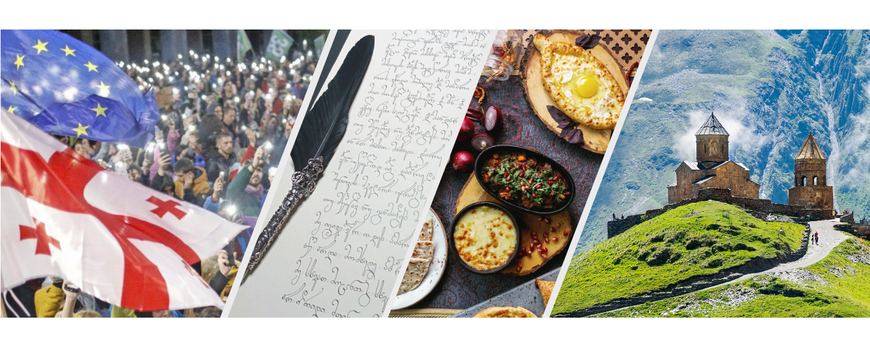GEORGIAN DAYS AT THE UNIVERSITY OF POTSDAM | 12-13 JULY 2024

FREE OF CHARGE | REGISTRATION BY EMAIL REQUIRED | sekwoelluuni-potsdampde (Eugen Rube)
Immerse yourself in the vibrant culture, rich language, and dynamic politics of Georgia!
Since regaining independence from the Soviet Union in 1991, Georgia has experienced significant political turbulence and transformation. The early years were marked by civil unrest and economic challenges, culminating in a brief civil war in 1991-1992. The presidency of Eduard Shevardnadze, a former Soviet foreign minister, from 1992 to 2003, was characterized by attempts at stabilization but marred by corruption and inefficiency.
The pivotal moment came with the 2003 Rose Revolution, a peaceful protest movement that ousted President Eduard Shevardnadze and brought Mikheil Saakashvili to power. Saakashvili's tenure from 2004 to 2013 was marked by ambitious reforms aimed at curbing corruption, improving infrastructure, and aligning Georgia more closely with Western institutions like NATO and the European Union. These achievements made Georgia one of the most successful examples of transformation and reform within the post-Soviet space. However, Saakashvili´s administration faced criticism for authoritarian tendencies and human rights abuses, reflecting the complex and challenging path of Georgia's ongoing political evolution.
In 2008, Georgia fought a brief war with Russia over South Ossetia and Abkhazia, leading to Russian occupation of these territories and ongoing tensions. Since 2012, the Georgian Dream party has been in power, focusing on economic development and Euro-Atlantic integration, but facing accusations of democratic backsliding. The law on ‘foreign agents’, which has set off the latest mass protests in Georgia, has once again brought the country to a crossroads.
Join us for two unforgettable days of insightful guest lectures, interactive workshops, delicious Georgian cuisine and traditional music! The following program will give you an overview of the Georgian Days.
12 JULY | |
| 14:15 | Opening remarks by |
| 14:45 | Georgia, Tbilisi, Tbilisi State University (TSU) as a place to live, research, and study
|
| 15:45 | Coffee break |
| 16:00 | How memory forges the future
|
13 JULY | |
| 10:30 | Crash course in the Georgian language
|
| 12:00 | Brunch |
| 12:30 | Europeanisation and Euroscepticism in post-Soviet Georgia
|
| 14:00 | Coffee break |
| 14:15 | “Quo Vadis Georgia?” - Concluding discussion Prof Nino Chikovani (TSU) moderated by Dr. Stanislav Klimovich (UP) |
| 15:30 | Networking dinner with Georgian food and music |
FREE OF CHARGE | REGISTRATION BY EMAIL REQUIRED | sekwoelluuni-potsdampde (Eugen Rube)

